- Home
- Jane Smiley
Ten Days in the Hills Page 10
Ten Days in the Hills Read online
Page 10
“So what thought are you thinking now?”
“I’m thinking that your arm is very nice and that I enjoy stroking it.”
“I am so wide awake. We have to get to sleep before the sun comes up, or we won’t get to sleep at all. If you go to sleep, I will, too. So this is what I’m going to do. Lie back.” She arranged his pillow and he lay back. “Close your eyes.” He closed his eyes. “Now look right at your eyelids. You feel that sensation of being blocked inside your skull? That’s good. Leo taught me this. He can sleep anywhere. Keep looking at your eyelids. Now take a deep breath and imagine yourself humming. Just a low hum.” As he was doing this, she began stroking his forehead very lightly, up by his hairline. One more time, she said, “Look at your eyelids, and don’t forget to hum.” Here was his dream. He was driving up the 405, and the air was a little smoggy, and he saw a glacier inching down a mountain off to his left, right beside the highway, brilliantly white in the Southern California sunlight, and he thought he knew what that was, but he couldn’t remember.
As Stoney stepped out onto the deck surrounding the swimming pool, carrying the scripts he had intended to read the day before and really had to read right now, before he went to the office, he heard Cassie say to Zoe, “Did you ever meet this guy Aaron Tolchin?”
“I met Michael Tolkin. He and his brother talked to me once about a movie they wrote that they thought had a part for me.”
“No, not him. This other guy, who was in the paper for the fund-raising scam. What was his name?”
“Tonken,” said Stoney. “Aaron Tonken.” He set the scripts down on a table. There were five of them. Five scripts had been nothing for Jerry—he read five scripts every night before going to bed. Stoney had been lugging these around for three days now.
“I don’t know,” said Zoe. “What does he look like?”
“Odd,” said Cassie. “Not pretty. His head and neck look like they have the same circumference. He came into the gallery once and asked if he could do a fund-raiser there, but then he never came back, so I didn’t follow it up, but then I saw that article in the paper yesterday.”
“Paul and I don’t read the paper. Maybe he did that fund-raiser for the West Hollywood Book Fair.”
“The West Hollywood Book Fair is a fund-raiser.”
“Remember I cooked something there? I cooked orange tarts with raspberry sauce and sang songs about desserts, like ‘The Good Ship Lollipop’ and ‘Big Rock Candy Mountain.’ I had to appear at ten a.m., and there were about twenty-five kids there, and the accompanist didn’t show up, but it was fun. All the kids came up and ate the tarts afterward.”
“You’re lucky you didn’t get sued,” said Cassie.
“Well, the parents had to sign a release,” said Zoe. “This is California, after all.”
Stoney moved one of the lounge chairs into the sunshine and sat down on it. Max’s pool, which was on a deck about fifteen feet below the kitchen, got sun for only about four hours on the best days, but it was quiet and you could look down the hillside and get a bird’s-eye view of the Japanese garden, which was in a cleft in the hillside another thirty or forty feet down. And there were potted flowers and bonsai on many of the steps. The garden was Max’s indulgence, and Stoney knew that it cost him a lot of money that other people would have put into refurbing the house, but Max was content that the house not be grand, and, in particular, not look grand from the street. Stoney thought he would wait for Max here, and then he would lure Max down the steps to the Japanese garden, and then he would make his proposal. He said, “I talked to Tonken about doing a fund-raiser once for Dorothy, for the L.A. Philharmonic. He said he could get Jack Nicholson.”
“For the L.A. Philharmonic?”
“Oh, Dorothy had some idea. I think the only movie Jack ever made that Dorothy saw was Five Easy Pieces, and that stuck in her mind, and of course Dorothy is she who must be obeyed, so I sent out a few feelers, and Tonken called me, but he was such a gossip, and nothing he said about anyone was nice, so I got a weird feeling about him and didn’t pursue it. In the paper it said he was paying a lot of celebrities to show up at the fund-raisers, and the paper was treating this as if it were a big deal.”
“Hunh,” said Cassie. Stoney eyed Zoe, to see if this last remark would get a rise out of her, but she didn’t react, and he couldn’t tell if it was because she hadn’t heard him or she didn’t care. Zoe interested him. She was a terrible actress, the sort of actress who moved twenty facial muscles in preference to two, and so he couldn’t watch any of her movies—she always seemed to him to be bursting off the screen, like the monsters in Alien—her mouth opened, and then another mouth seemed to open, and in some cases it was a song pouring forth, and in other cases it was some sort of emotion manufactured for the occasion. But Stoney kept his opinions about her acting ability to himself, and he liked Zoe. She had been nominated for a Best Supporting Oscar once but hadn’t won. She was very beautiful, though not as beautiful as she had been ten years ago, and Stoney felt he was entitled to this opinion because he and Zoe were only about five years apart in age. If this guy Paul was a healer, well, once again Zoe had done just the right thing, because now she was forty-three, and every actress in Hollywood who was forty-three needed a healer to help her accommodate herself to the decline of her looks, her career, and her prestige.
And she didn’t act like any beautiful woman he had ever met, young or old. Deep in her heart, Stoney thought, either she didn’t care about men and her effect on them, or else she didn’t care about her effect on anyone, men or women. In Hollywood, where talent and looks were always seeking financing, and financing was always surrounding itself with talent and looks, Zoe’s bone-deep indifference was very unusual. Yesterday, when she came in, Stoney had watched her, trying to gauge who her eyes sought out—Delphine? Isabel? Max? Paul? even Charlie or Elena or himself? To whom did she look for reassurance? But she didn’t look at anyone—that is, her look didn’t pause on anyone. It paused on the windows to the deck, on a painting Max had that Stoney, too, liked, of a woman lying on a beach under a thundery sky. So, even while Zoe was talking vivaciously, being friendly and affectionate and entertaining, and even seductive, Stoney saw that it meant nothing—there was nothing she wanted, even from Isabel (who on principle wasn’t giving her anything), even from Paul (who seemed to think Zoe wanted something from him, though perhaps she was only performing some sort of ritual supplication toward him). There was nothing she wanted even from her mother. This Stoney found the most interesting of all. Supposedly, everyone in the world wanted things from his or her mother. Supposedly, every mother in the world was a power in the life of her child. He would have expected a woman like Zoe, with a Hollywood career, to at least cultivate her relationship with Delphine as an emblem of her humanity and her connection with average people, but she didn’t.
Now Paul came up the stairs, head, neck, shoulders, torso, legs, feet. He was wearing swimming trunks and flip-flops and carrying a towel. His beard, of course, was heavy and thick, but he had no hair on his chest, which looked to Stoney to be older than the rest of him—the skin over his pectorals was shiny and wrinkled. Zoe said, “Did you do your yoga, dear one?”
“I did. I rolled out my mat in the garden. It was very pleasant.”
“I love that garden,” said Zoe.
“Good morning, good morning.” Paul nodded congenially to Cassie and then to Stoney. Cassie said, “Do you do yoga every day?”
“I do,” said Paul, and as he opened his mat on the deck and sat down on it, Stoney saw that this must be true, because he was very supple—not showing-off supple, but simply catlike in the smooth efficiency of his movements. He leaned down and kissed Zoe on the lips, while she turned upward to meet him in a natural way, then he sat on the mat with his legs crossed and looked around. He said, “This is a nice spot. What an interesting house to find in L.A.” His back was perfectly straight, right out of a yoga manual. Stoney said, “So—how long have you been doing yoga?
”
Paul turned to looked at him. “Thirty-some years at this point.”
“Every day?”
“I think I can say every day, yes. I can’t remember missing a day.”
“Paul is very disciplined,” said Zoe.
“I don’t call it discipline anymore,” said Paul. “Or even habit. I don’t call it anything, actually.”
There was a long pause, during which Stoney expected Paul to continue talking, but he didn’t. Out of the corner of his eye, Stoney saw Cassie throw him a glance, but Stoney didn’t acknowledge it. Zoe offered, “Paul doesn’t narrate his life. He simply lives, don’t you, dear one?”
“I’ve become less attached to certain uses of words, yes,” said Paul. Then he was silent again. His silence did have an authentic quality about it, Stoney thought, and even though he was sure that Paul had done yoga for thirty-some years and that the testament of the healer’s straight spine and the weight evenly balanced on his two buttocks was true, Stoney felt tendrils of skepticism growing out of him toward the other man, originating, perhaps, only in some sort of who-do-you-think-you-are response toward the formal diction and upright manner. He said, “Have you been in L.A. for a long time?”
“I have an apartment in L.A., but it’s been more or less just for stowing things for some years.” Silence again.
Cassie said, “Where is it?”
“In an old apartment complex in Westwood. It’s a one-bedroom that I started renting in the eighties.”
“There’s no bed,” said Zoe.
“I have a futon rolled up in the closet. I sleep there from time to time.”
“Paul isn’t attached to things,” said Zoe.
“Well, I try not to be,” said Paul. His tone was inhumanly even, Stoney thought. And his next thought was, Well, if he’s so enlightened, why isn’t he famous? He could see that Cassie was thinking the same thought. It was a very Hollywood thought.
Cassie said, “Are you from L.A.?”
“I grew up mostly in Michigan and Ohio.”
“You don’t see that very often,” said Cassie.
Stoney gave a bark of laughter, and Cassie glanced at him. She said, “Well, you don’t. I don’t know why that is, but people from Michigan and Ohio don’t seem to turn up in L.A. as much as people from Iowa and Wisconsin, for example, even though there are more people in Michigan and Ohio than there are in Iowa and Wisconsin. So how did you end up in L.A.?”
“I had a football scholarship to UCLA.”
At last, Stoney was impressed. If Paul had been doing yoga for thirty-some years and his hair was white and his beard was gray, then no doubt he was in his fifties, anyway, so he would have maybe played football in the sixties. Of course, Stoney didn’t know anything about UCLA in the sixties, but he said, “You got a scholarship all the way from Michigan and Ohio?”
“I did, yes. We all had crewcuts, and when we sat down to training table, you couldn’t tell us apart.” He smiled. When he smiled, Stoney realized that he hadn’t seen Paul smile before. He said, “Did you start or anything?”
“I broke my foot freshman year, jumpng out of a second-story window in the dorm, and after that I really wasn’t fast enough anymore. I was an end. My only claim to fame was speed. But they let me stay at UCLA.”
“Dear one, why were you jumping out of a second-story window?” said Zoe.
“I was drunk, and my roommate dared me. It was the second time that night. The first time, I made it.”
Once again, Stoney waited for Paul to make this into a story, but he didn’t. They sat in silence, watching the sun expand its range around the swimming pool, until Zoe said, “You can’t believe all the exciting things Paul has done.”
Paul didn’t respond to this. Cassie said, “Name one.”
Paul didn’t respond to this, either, until Zoe said, interrogatively, “Dear one?”
“Excuse me,” said Paul. “I thought that remark was addressed to you.”
Silence again. Dorothy and Jerry, Stoney thought, would have dismissed Paul by this time as passive-aggressive, as they dismissed everyone who failed to rise to their requirements for sociability and congeniality—they had accused Stoney of being passive-aggressive when he refused to sing a song at a family party when he was thirteen years old—but Stoney found Paul’s manner fascinating. He was not at all able to divine the healer’s motives or level of self-consciousness. It was entirely possible that he was so self-conscious that he was no longer self-conscious at all—wasn’t that what yoga was for?
Zoe said, “Last year, Paul climbed the seven holiest mountains in western China. He’s been to China three times.”
“Is that one exciting thing?” said Cassie. “Or seven?”
“I did take some photographs,” said Paul.
“We should have a slide show,” said Zoe. “I’d like to see them.”
“I don’t mind that,” said Paul. “But I don’t have them with me.” Then he stood up suddenly, walked over to the edge of the pool, and dove in. Just then, Max and Isabel came down the stairs from the kitchen. Stoney eyed Max. He looked normal. Then he looked at Isabel. She looked sleepy, but not tired or depressed. She glanced toward him and smiled. It was the same collusive smile she had been giving him for years now, impish and pleased with herself, and therefore pleased with him. He said, “Hey, Max,” and cocked his head toward the steps down to the Japanese garden. Max said, “You been to your office this morning?”
“Not yet. I’ve talked to them several times, though.”
“Are you getting reception down here?”
Stoney looked at the cell phone in his hand. There were no towers. “Nah. I went out the front door and stood in the middle of the cul-de-sac. I can get about two towers there. I get three at my house. I guess the hillside is pointing in the right direction there, because that’s lower than your house.”
“That reminds me,” said Zoe. “We’d like to stay rather than go to the monastery. Paul is thrilled with the room, and I’m not looking forward to the drive at all. We’ve put it off three times already, and by the time we get there, my guess is the war will be over, and we’ll just have to come right back.”
Stoney looked at Isabel, but Isabel forbore to say anything. Only when Max said, “Sure, Zoe,” did Isabel poke him in the ribs. Zoe evidently noticed this, but she didn’t comment, just turned her head elaborately away, toward the pool, while saying, “Thank you, Max. I appreciate it,” rather stiffly. Max, who was carrying the morning paper, sat down on the end of a deck chair and opened it up, taking his reading glasses out of the pocket of his shirt and balancing them on the end of his nose. Paul hoisted himself out of the pool, and Zoe told him they were staying. Paul went over to Max, who looked up from his paper. Paul said, “You’re kind to let us stay. Thank you.”
“Sure. No problem,” said Max, and he went back to his paper. Stoney knew that it was no problem, but the exchange Jerry and Dorothy would have been having about this whole setup ran through his mind:
Jerry: He put them in that room off the garden for ten days, so what?
Dorothy: She’s got a perfectly good place of her own, though how she got stuck with that Tudor monstrosity I’ll never know. If she’d come to me when she was moving from Malibu, I would have set her up with Delilah Mossadeh. She’s Iranian, she knows every house on the market.
And then Jerry would have come prowling in the front door. He would have felt the soil in the potted plants and looked into the refrigerator and straightened a picture and peeked into Max’s room, and maybe into his closet (to see where he was buying his suits and how old they were). He would have knocked on Delphine’s door and gotten her out on her front porch and said, “Hey, how ya doing? You look good for an old lady. How about me? You need anything? How’s Isabel?” Then he would have stood on the deck for five minutes with his hands in his pockets, staring at the Getty, and finally he would have gone down the forty-eight steps, plucking leaves off the plants as he went down, rolling them bet
ween his thumb and forefinger and smelling them, putting a gardenia in the lapel of his jacket. Then he would have walked right into the garden room, and Stoney imagined Paul and Zoe engaged in some sort of sexual congress, let’s say she is up against the wall with her legs wrapped around his waist and he’s kissing the base of her neck and her head is thrown back, and just then Jerry says, “Hey, how ya doing? Everything okay in here? I just had a thought. What d’ya say? Seems a little damp to me. Maybe I could have them send over a dehumidifier. Nothing loud.” And then he would stroll through the Japanese garden and climb the steps and walk around the house on the deck instead of going through, and he would look at the exterior walls in a critical way, as if he could tell whether the house was going to fall down the hillside, and he would get into his Jaguar, and as soon as he had decent reception, he would tell his secretary to order Max a dehumidifier, “But tell Delivery that they have to carry it down a lot of steps, got that? Great.” Stoney laughed to himself, and Max looked at him over the paper. Stoney said, “I miss my dad.”
And Max said, because he knew why a laugh would mean that Stoney missed Jerry, “Me, too. I miss your dad every single day.” He folded up the paper, then he said, “I would have liked to hear what your dad would have said about this war.”
“I don’t know what he would have said. He never forgave Saddam for lobbing missiles at Israel during the Gulf War. But he hated Cheney, too. One of the last political conversations we ever had was about the energy crisis a couple of years ago. He said to me, ‘You mark my words, there’s some kind of shit happening at Enron, and they’re trying to cover their asses by fleecing California, their biggest and richest customer, and Cheney knows all about it.’ So I think this would have been a tough one for him.”

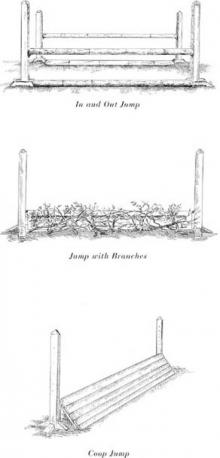 The Georges and the Jewels
The Georges and the Jewels Pie in the Sky: Book Four of the Horses of Oak Valley Ranch
Pie in the Sky: Book Four of the Horses of Oak Valley Ranch Duplicate Keys
Duplicate Keys Charles Dickens
Charles Dickens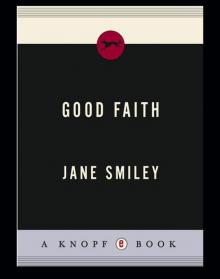 Good Faith
Good Faith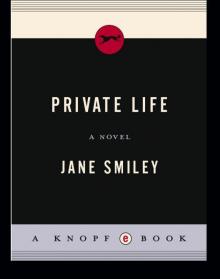 Private Life
Private Life A Thousand Acres: A Novel
A Thousand Acres: A Novel The Greenlanders
The Greenlanders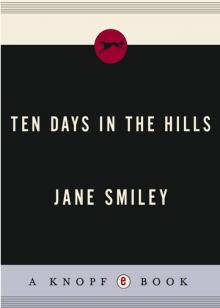 Ten Days in the Hills
Ten Days in the Hills Gee Whiz: Book Five of the Horses of Oak Valley Ranch
Gee Whiz: Book Five of the Horses of Oak Valley Ranch A Thousand Acres
A Thousand Acres The All-True Travels and Adventures of Lidie Newton
The All-True Travels and Adventures of Lidie Newton Ordinary Love and Good Will
Ordinary Love and Good Will Taking the Reins (An Ellen & Ned Book)
Taking the Reins (An Ellen & Ned Book) The Man Who Invented the Computer
The Man Who Invented the Computer Horse Heaven
Horse Heaven The Age of Grief
The Age of Grief Riding Lessons
Riding Lessons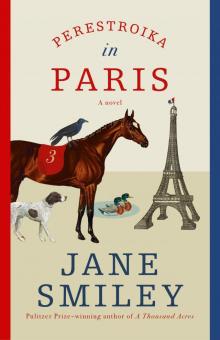 Perestroika in Paris
Perestroika in Paris A Good Horse: Book Two of the Horses of Oak Valley Ranch
A Good Horse: Book Two of the Horses of Oak Valley Ranch Saddles & Secrets (An Ellen & Ned Book)
Saddles & Secrets (An Ellen & Ned Book)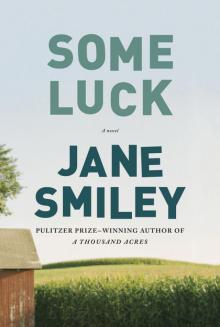 Some Luck: A Novel
Some Luck: A Novel Champion Horse
Champion Horse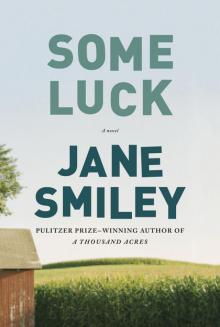 Some Luck
Some Luck Gee Whiz
Gee Whiz Barn Blind
Barn Blind A Thousand Acres (1992 Pulitzer Prize)
A Thousand Acres (1992 Pulitzer Prize) Pie in the Sky
Pie in the Sky True Blue
True Blue A Thousand Acres_A Novel
A Thousand Acres_A Novel A Good Horse
A Good Horse